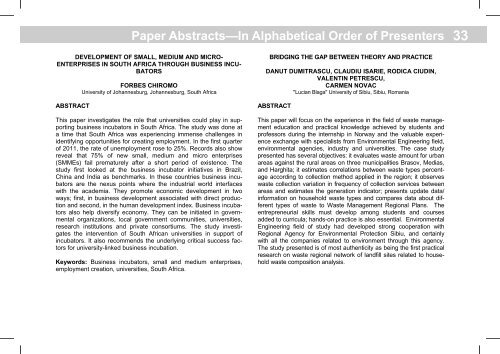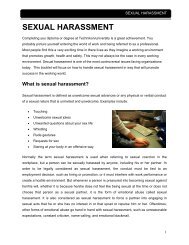Conference Booklet 11 Nov - Nina - CPUT ACTIVE Web - Cape ...
Conference Booklet 11 Nov - Nina - CPUT ACTIVE Web - Cape ...
Conference Booklet 11 Nov - Nina - CPUT ACTIVE Web - Cape ...
You also want an ePaper? Increase the reach of your titles
YUMPU automatically turns print PDFs into web optimized ePapers that Google loves.
Paper Abstracts—In Alphabetical Order of Presenters<br />
DEVELOPMENT OF SMALL, MEDIUM AND MICRO-<br />
ENTERPRISES IN SOUTH AFRICA THROUGH BUSINESS INCU-<br />
BATORS<br />
ABSTRACT<br />
FORBES CHIROMO<br />
University of Johannesburg, Johannesburg, South Africa<br />
This paper investigates the role that universities could play in supporting<br />
business incubators in South Africa. The study was done at<br />
a time that South Africa was experiencing immense challenges in<br />
identifying opportunities for creating employment. In the first quarter<br />
of 20<strong>11</strong>, the rate of unemployment rose to 25%. Records also show<br />
reveal that 75% of new small, medium and micro enterprises<br />
(SMMEs) fail prematurely after a short period of existence. The<br />
study first looked at the business incubator initiatives in Brazil,<br />
China and India as benchmarks. In these countries business incubators<br />
are the nexus points where the industrial world interfaces<br />
with the academia. They promote economic development in two<br />
ways; first, in business development associated with direct production<br />
and second, in the human development index. Business incubators<br />
also help diversify economy. They can be initiated in governmental<br />
organizations, local government communities, universities,<br />
research institutions and private consortiums. The study investigates<br />
the intervention of South African universities in support of<br />
incubators. It also recommends the underlying critical success factors<br />
for university-linked business incubation.<br />
Keywords: Business incubators, small and medium enterprises,<br />
employment creation, universities, South Africa.<br />
BRIDGING THE GAP BETWEEN THEORY AND PRACTICE<br />
DANUT DUMITRASCU, CLAUDIU ISARIE, RODICA CIUDIN,<br />
VALENTIN PETRESCU,<br />
CARMEN NOVAC<br />
"Lucian Blaga" University of Sibiu, Sibiu, Romania<br />
ABSTRACT<br />
This paper will focus on the experience in the field of waste management<br />
education and practical knowledge achieved by students and<br />
professors during the internship in Norway and the valuable experience<br />
exchange with specialists from Environmental Engineering field,<br />
environmental agencies, industry and universities. The case study<br />
presented has several objectives: it evaluates waste amount for urban<br />
areas against the rural areas on three municipalities Brasov, Medias,<br />
and Harghita; it estimates correlations between waste types percentage<br />
according to collection method applied in the region; it observes<br />
waste collection variation in frequency of collection services between<br />
areas and estimates the generation indicator; presents update data/<br />
information on household waste types and compares data about different<br />
types of waste to Waste Management Regional Plans. The<br />
entrepreneurial skills must develop among students and courses<br />
added to curricula; hands-on practice is also essential. Environmental<br />
Engineering field of study had developed strong cooperation with<br />
Regional Agency for Environmental Protection Sibiu, and certainly<br />
with all the companies related to environment through this agency.<br />
The study presented is of most authenticity as being the first practical<br />
research on waste regional network of landfill sites related to household<br />
waste composition analysis.<br />
33





